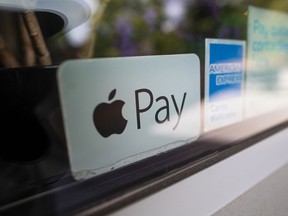Not good news for rivals Klarna and Affirm

Article content
Apple Inc is jumping into the buy now, pay later market, adding another challenge to fintech companies such as Klarna and Affirm that are already grappling with investor pressure, slower e-commerce growth and rising interest rates.
Advertisement 2
Article content
The iPhone maker announced the move as part of a range of product updates at its annual developer conference on Monday, alongside a new version of its custom processor for desktop computers, M2.
With Apple Pay Later, iPhone and Mac users in the U.S. can pay for purchases in four instalments over six weeks without being charged interest or other fees. The system will work using Mastercard’s network at any location that supports Apple Pay, online and in physical retail stores.
Apple’s entry into the market follows its acquisition of UK-based credit-checking start-up Credit Kudos this year.
The Silicon Valley company has been steadily pushing deeper into financial products over recent years, as part of its broader drive to boost sales from services such as Apple Music and iCloud storage. It has offered multiyear instalment plans for purchases of expensive gadgets such as iPhones and Macs for seven years. In 2019, it partnered with Goldman Sachs and Mastercard to launch Apple Card, a credit card for U.S. customers with no annual fees.
Advertisement 3
Article content
However, its latest move to offer short-term loans for a broader range of purchases comes as the coronavirus pandemic’s e-commerce boom begins to wane, slowing the rapid growth of existing buy now, pay later (BNPL) services.
Regulators in Europe and the U.S. are keeping a close eye on BNPL companies, to ensure that short-term credit is offered responsibly at a time of soaring inflation. There are also concerns over how well consumers understand the debt they are taking on.
Analysts expect rising defaults and lower non-discretionary spending to hurt profit margins at fintech specialists such as Affirm and Klarna, while rising interest rates could push up operating costs for some players.
Apple said its BNPL system was “designed with users’ financial health in mind”, including a dashboard to monitor payments within its Wallet app. It noted that a customer’s card-issuing bank “may charge a fee” if their debit card account contained insufficient funds for repayments.
Advertisement 4
Article content
Shares in Affirm fell 5.5 per cent to US$23.72 on Monday, extending what is now a 75 per cent drop in the fintech company’s stock price since the start of 2022. “Even as more providers join the movement we started, the prize remains massive, and we don’t think anyone can do what our team and our technology can do,” said Affirm.
Its European rival Klarna said last month that it would cut hundreds of jobs, or about 10 per cent of its workforce, as it switches focus from growth to profitability. Some investors fear Klarna’s US$46 billion valuation will be slashed as it looks to raise more financing.
Apple’s repayments service will be available to “qualifying applicants” in the U.S. when the next version of the iPhone’s operating system, iOS 16, launches this year.
Advertisement 5
Article content
-

Why the CEO of buy now, pay later giant Klarna has his sights set on Canada
-

The ‘stealthy enablers’: Canada’s smaller banks court fintechs as industry dynamics shift
-

BDC Capital turns to pension funds for clean tech expansion
Other iOS features announced at Apple’s annual Worldwide Developers Conference included a redesign of the iPhone’s home screen to allow for greater personalization, and updates to its texting app, iMessage, to allow users to edit or delete messages after they are sent.
Apple announced a second generation of its own specialized silicon for Mac computers, the M2, which will boost the power and energy efficiency of its predecessor and deepen its rivalry with traditional PC chipmakers such as Intel and AMD. The M2 chip, which is again based on customized Arm architecture, is designed in house by Apple and will power a new range of MacBook Air and Pro laptops.
The company declared its plan to “replace passwords for good” with a biometrics-based system called Passkeys, to log into apps and websites. The system will also work with apps and devices made by Google and Microsoft as part of an industry alliance designed to tackle phishing attacks and password leaks.
© 2022 The Financial Times Ltd






More Stories
Acceptance of Credit Cards Without a Merchant Account
Maximize Your Medisoft! (Unknown and Underused Functions of Medisoft)
Learning About the Reverse Mortgage Option